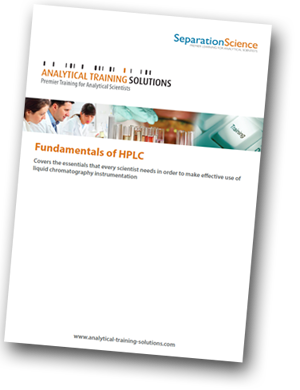 Are you new to HPLC, or do you supervise new users of HPLC? 'Fundamentals of HPLC' is taught by Tom Jupille, a world-class expert in HPLC, and represents an opportunity to give new users a firm grounding in the fundamentals of HPLC economically and with minimum disruption to work schedules. “Fundamentals of HPLC” is intended for beginner chromatographers. No hands-on LC experience is required, but you should have a solid grasp of basic chemistry.
Are you new to HPLC, or do you supervise new users of HPLC? 'Fundamentals of HPLC' is taught by Tom Jupille, a world-class expert in HPLC, and represents an opportunity to give new users a firm grounding in the fundamentals of HPLC economically and with minimum disruption to work schedules. “Fundamentals of HPLC” is intended for beginner chromatographers. No hands-on LC experience is required, but you should have a solid grasp of basic chemistry.
In the 'Retention' module in the 'Measurements and Parameters' section, you will see how retention (k’) is the most important characterization parameter in HPLC. We’ll look at why it’s defined the way it is and the reason it has an optimum range of values.
You will learn about:
- The capacity factor, k' and how it is calculated
- Estimating t0
- Effects of sample overload
- Factors controlling retention (k')
This module has a complementary quiz. By correctly answering all of the quiz questions for all of the modules in the 'Fundamentals of HPLC' course you will be able to download your certificate of completion.
By taking this online course you will acquire a good understanding of the fundamentals of HPLC and get a better knowledge of the key concepts involved. The course is aimed at new users, as well as managers, supervisors, auditors, reviewers, etc. who use information generated by HPLC but do not necessarily do chromatography themselves.
The course price is US$ 189 for one user for 12 months of access. Multi-user pricing is also available, as are site licences for larger teams with multiple course requirements.
Analytical Training Solutions, brought to you by Separation Science, is the leading global portal for fundamentals, best practice, troubleshooting and method development training for chromatographic and mass spectrometric techniques. Comprehensive, self-paced online courses and validated learning provides a unique education resource for analytical chemists. Currently we offer HPLC training, LC-MS training, GC training and GC-MS training.
